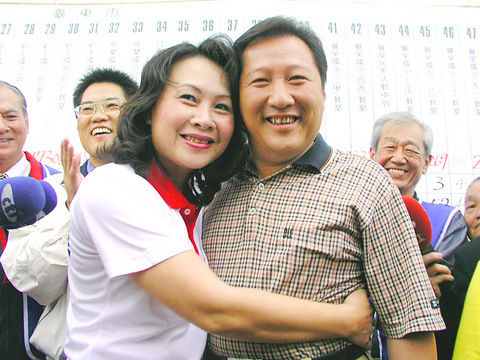Chinese Nationalist Party (KMT) candidate Kuang Li-chen (鄺麗貞) yesterday won the Taitung County Commissioner by-election.
Kuang is the ex-wife of Wu Chun-li (吳俊立), a KMT member who was elected county commissioner last December, but was then suspended from his post immediately upon assuming office because of a corruption conviction.
Wu then divorced his wife, Kuang, in an attempt to sidestep restrictions preventing a commissioner from selecting a relative or spouse as deputy. Kuang then joined the KMT to run for the Taitung post.

PHOTO: HANG TSUN-WEI, TAIPEI TIMES
Kuang received 42,578 votes in yesterday's poll, triumphing over three independent candidates by a large margin. Former Taitung deputy commissioner Liu Chuan-hao (劉櫂豪) received 19,110 ballots, former Taitung mayor Lai Koon-cheng (賴坤成) received 4,765 votes and Aboriginal candidate Lofa (
Kuang, accompanied by Wu, yesterday evening received the congratulations of supporters at her headquarters and thanked residents.
"We won it back," she said.
Although Wu's ex-wife and the KMT won back the post, KMT Chairman Ma Ying-jeou (馬英九) has been criticized for going to the county and publicly campaigning for the ex-wife of a man who has been convicted of corruption and vote-buying.
Wu was charged with corruption while a Taitung County councilor.
In 2002, the Taitung District Court sentenced him to 16 years in prison. Mayors or commissioners found guilty of corruption by local district courts are suspended from office.
Wu has appealed the ruling.

CHAOS: Iranians took to the streets playing celebratory music after reports of Khamenei’s death on Saturday, while mourners also gathered in Tehran yesterday Iranian Supreme Leader Ayatollah Ali Khamenei was killed in a major attack on Iran launched by Israel and the US, throwing the future of the Islamic republic into doubt and raising the risk of regional instability. Iranian state television and the state-run IRNA news agency announced the 86-year-old’s death early yesterday. US President Donald Trump said it gave Iranians their “greatest chance” to “take back” their country. The announcements came after a joint US and Israeli aerial bombardment that targeted Iranian military and governmental sites. Trump said the “heavy and pinpoint bombing” would continue through the week or as long

TRUST: The KMT said it respected the US’ timing and considerations, and hoped it would continue to honor its commitments to helping Taiwan bolster its defenses and deterrence US President Donald Trump is delaying a multibillion-dollar arms sale to Taiwan to ensure his visit to Beijing is successful, a New York Times report said. The weapons sales package has stalled in the US Department of State, the report said, citing US officials it did not identify. The White House has told agencies not to push forward ahead of Trump’s meeting with Chinese President Xi Jinping (習近平), it said. The two last month held a phone call to discuss trade and geopolitical flashpoints ahead of the summit. Xi raised the Taiwan issue and urged the US to handle arms sales to

State-run CPC Corp, Taiwan (CPC, 台灣中油) yesterday said that it had confirmed on Saturday night with its liquefied natural gas (LNG) and crude oil suppliers that shipments are proceeding as scheduled and that domestic supplies remain unaffected. The CPC yesterday announced the gasoline and diesel prices will rise by NT$0.2 and NT$0.4 per liter, respectively, starting Monday, citing Middle East tensions and blizzards in the eastern United States. CPC also iterated it has been reducing the proportion of crude oil imports from the Middle East and diversifying its supply sources in the past few years in response to geopolitical risks, expanding

OTHER OPTIONS: Given possible US intervention and Taiwanese counterattacks, China might opt to blockade Taiwan or take its outlying islands instead of an all-out invasion A US think tank has urged Taiwan to adopt a “hellscape” strategy that would flood the Taiwan Strait with drones and other uncrewed systems to deter invasion by China. In its report, Hellscape for Taiwan, published on Thursday, the Center for a New American Security said Taipei’s asymmetric defense approach — often described as a “porcupine strategy” — needs to evolve to keep pace with the growing capabilities of the Chinese People’s Liberation Army. The “hellscape” strategy involves saturating the air and waters around Taiwan with thousands of drones and other platforms capable of striking invading forces from multiple domains at once. Long-range